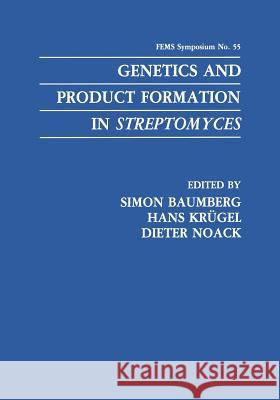Genetics and Product Formation in Streptomyces » książka
Genetics and Product Formation in Streptomyces
ISBN-13: 9781468459241 / Angielski / Miękka / 2012 / 340 str.
The Streptomycetes are industrially widely used microorganisms due to their ability to produce numerous different chemical compounds. These show very varied effects upon other living systems, and result from profound and subtle biochemical and morphological differentiation during the streptomycete life cycle. It is therefore not surprising that research on the genetics of antibiotic biosynthesis and differentiation in this group is currently progressing rapidly in many countries. Intimately connected with the production of antibiotics is resistance to them; analysis of this is giving further information about the origin and evolution of this class of genes and their hypothesized spread among other microorganisms. Another interesting feature of the Streptomyces group is their mycelial growth. Also, their ecologically important utilization of high molecular weight compounds requires enzymes to be transported outside the cell to hydrolyze non-diffusible substrates. Finally, we have as yet limited understanding of the various mechanisms of genome rearrangement observed in some of these species; deletions and/or amplifications of enormous amounts of DNA can occur without seriously affecting the viability of the organism under laboratory conditions. The present volume, which includes contributions addressing the above subjects and others, originates from a meeting on "Genetics and Product Formation in Streptomyces" sponsored by the Federation of European Microbiological Societies in Erfurt on May 1-6 1990. Compared to previous ones of this kind held in 1979, 1983 and 1987 in Weimar, one can point to impressive progress in the study and applications of Streptomyces genetics.











